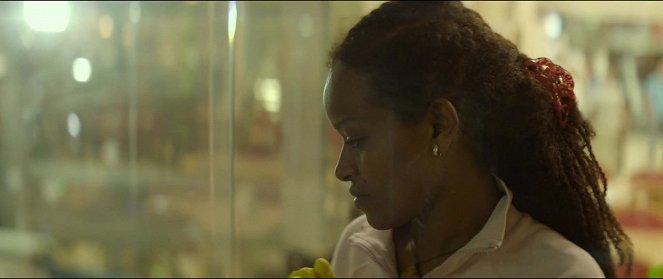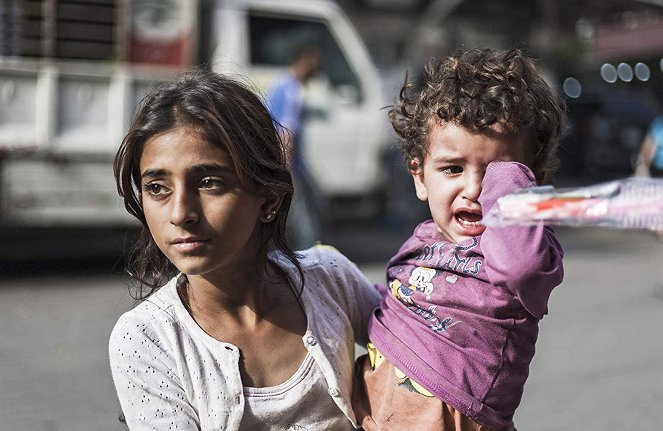Rendező:
Nadine LabakiOperatőr:
Christopher AounZeneszerző:
Khaled MouzanarSzereplők:
Zain Alrafeea, Yordanos Shifera, Boluwatife Treasure Bankole, Kawthar Al Haddad, Fadi Kamel Youssef, Haita Izam, Alaa Chouchnieh, Nadine LabakiTartalmak(1)
A 12 éves libanoni Zain bepereli a szüleit, amiért életet adtak neki. A fiú azt gondolja, hogy apja és anyja nem alkalmasak szülőknek, felelőtlenül vállalnak gyerekeket: azt kéri a bíróságtól, hogy az ítélet ezt mondja ki. A tárgyaláson megelevenedik egy olyan kisfiú élete, aki a felnőtteket is megszégyenítő módon vigyáz testvéreire, tiszta szívvel és hatalmas felelősségérzettel fordul gyerektársai felé. Zain eddigi, rövid élete alatt több bölcsességre tett szert és több szeretetet adott, mint mások öregkorukig – de ez felhatalmazza őt arra, hogy a szülein számon kérje, hogy a világra hozták őt? (Mozinet)
(több)Videók (3)
Recenziók (5)
Nadine Labaki's latest film, from the synopsis, threatens the usual misery porn for Western audiences, and definitely touches on it a few times, especially in scenes involving a black bumbler wandering Beirut in confusion with a sunrise pimple smeared with sunar. What redeems the director, however, is her Lebanese nationality, which makes the film feel authentic throughout (apparently a lot of the footage was shot guerrilla-style), the chaos and filth of the street are palpable, and most importantly we are not bothered by the arrogant visions of idyllic hope and redemption that Western filmmakers ascribe to similar themes in order to lift their own spirits. Capernaum stays in Beirut throughout, and if it equates the issues depicted within the framework of globalism, it does so not with words, but by deploying Western pop culture phenomena throughout the set, whether it's Spider-Man's toothless cousin, plush minions in children’s beds behind slum walls, or a Mickey Mouse smiling at the bleak plight of a doomed family. Most of all, however, the author's place of influence is evident in the plot itself, which fundamentally contradicts the classic Western perception of the family as a tight circle that must overcome the adversities of its surroundings in a tight embrace. Here the family is the greatest enemy, weakly hindering one's flourishing, ambitions, and future, an enemy from which one must disengage in the first place. It is the problematic aspect of the traditional family and its final say in deciding on its offspring (which Labaki, as a woman in the Arab world, probably also experienced) that is a rather original motif here, which may look extreme, inappropriate, bold, or scandalous in first world countries, but which needs to be discussed in terms of the social development of the countries in question. PS: Zain Al Rafeea is a child Robert De Niro.
()
Oh Zain, you broke my heart. With your innocence, maturity, and perseverance. And no one taught you that. The direction, the cinematography, the acting, the believability of the story, everything is pitched just right and in such a way that it moves you and at the same time "rips you to shreds". I can't remember the last time a film hit me so emotionally and uncontrollably. I don't think it's happened in the past year. I can't think of a better way to comment on something so fragile. My hat is off to Nadine for the way she was able to grapple with such content, it must have hurt terribly. 5 stars.
()
Capernaum tells the story, without over-sentimentality, of the turbulent fate of twelve-year-old Zain as he makes his way through the slums of Lebanon. I don't think any of us would want to be born into the conditions he lived in. I quite understand his train of thought and subsequent actions of despair. Many facts made me sad while watching the film, but musically I found myself in seventh heaven a few times. At the very end, it was very nice to see a certain amount of hope in the boy's transformed face when the photographer said to him: "Smile, Zain. That's on your ID, not your death certificate." (90%) +++ I am quite puzzled by certain comments of some individuals who lack the slightest hint of empathy or compassion. Which just goes to show how rotten our would-be humane society can be. What makes us so different from the people in this film? I don't think it's that much. Most likely, simply changing the social environment, replacing affluence with poverty, would swiftly deliver a strong moral wake-up call to our compatriots. I don't even want to imagine how they would then give free rein to their base instincts.
()
Where are the times when the Phoenicians ruled over the trade all over the Mediterranean? Nowadays instead of them, there rules Lebanon that offers film-making art on quite a high level and they are on that level because their movies are about people who are ostracized by society. Moreover their movies seem like they are showing the reality of their country. Capernaum offers a powerful experience with a story about a little boy who survives in the streets, becomes wordly-wise and sometimes even experiences moments of fame. This premise is almost a classic and therefore I’m not rating it with 5 stars. The last shot showing the boy makes you contemplate how little is enough or that it is possible to do anything with the picture, right?
()
This film makes me sad. Not because of its content, which goes to such extremes that it loses its persuasiveness, but due to the fact that Nadine Labaki squanders her talent by presenting two gruelling hours of shots of sad (often crying) faces of emotionally and otherwise destitute characters (often children). It is basically just a pile of evidentiary material explaining why twelve-year-old Zain decided to sue his parents for conceiving him. I hope that was not the intention, but the film, which borders on poverty/misery porn (it crosses that line in scenes underscored by sentimental music) throughout its runtime, gives the impression that poor people, whose motivations are not in any way clarified, should not have children at all. The system represented in the film by the judiciary and the police by all accounts seems to work, and the complicity of the upper class is not taken into account at all. The final “corpse” is apparently supposed to refer to The 400 Blows, but Truffaut’s adolescence in difficult conditions did not deprive him of all joy and he did not make such a terribly didactic and one-sided film that basically goes nowhere, but rather only clubs us to death with misery, loneliness and suffering and more and more unfortunate twists of fate. 40%
()



Hirdetés